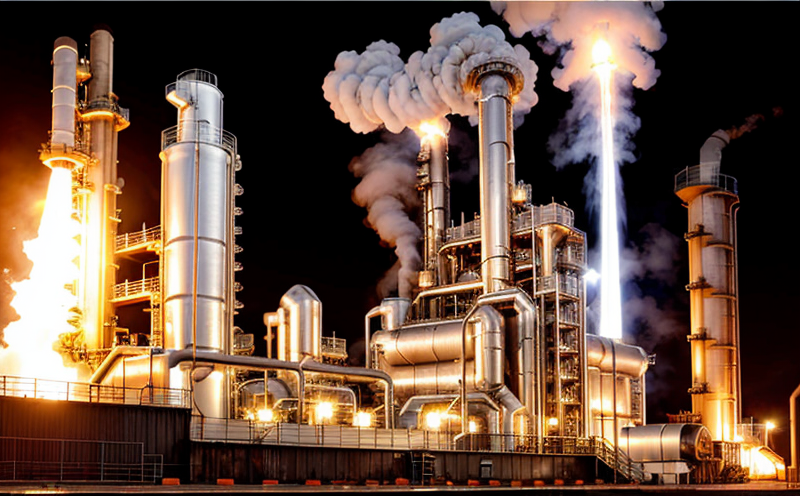ASTM E1479 Oxygen Determination in Titanium Alloys
The ASTM E1479 standard provides a precise method for determining the oxygen content in titanium alloys, which is critical for ensuring product quality and performance. This test measures the oxygen content of these materials using anodic polarography coupled with coulometric titration. Oxygen content can vary significantly depending on the alloy type, heat treatment process, and manufacturing methods, making it essential to have accurate data.
This testing procedure is used in various industries such as aerospace, automotive, and medical device manufacturing where titanium alloys are widely employed due to their high strength-to-weight ratio, corrosion resistance, and biocompatibility. Accurate oxygen content measurement helps control the quality of these materials throughout the production process, ensuring that final products meet stringent performance criteria.
The testing involves several steps: first, a known mass of the alloy sample is dissolved in nitric acid. Then, the solution containing titanium ions is electrolytically deposited onto a platinum electrode. The oxygen content in the deposited metal is then determined by measuring the current required to reduce the oxygen ions at the working electrode during coulometric titration.
The ASTM E1479 method allows for high accuracy and precision due to its use of advanced analytical techniques and well-defined procedural steps. It ensures that the oxygen content in titanium alloys is within specified limits, which are critical for maintaining product integrity. Compliance with this standard helps manufacturers meet regulatory requirements and ensure consistent quality across their products.
The test results can vary based on several factors including the type of alloy, the heat treatment process used, and the manufacturing methods applied. For instance, certain heat treatments may cause a slight increase in oxygen content due to oxidation reactions, while others might reduce it by eliminating excess oxygen from the material surface. Proper sample preparation is also crucial; any contamination or improper handling can lead to inaccurate readings.
By adhering strictly to ASTM E1479 standards and using appropriate instrumentation, laboratories can achieve reliable results that contribute significantly to process control in metallurgical refineries and manufacturing facilities. These accurate oxygen content measurements play a vital role in ensuring the quality of titanium alloys used in critical applications like aircraft components, surgical instruments, and other high-performance parts.
- Aerospace: Ensures reliability and safety of airframe structures.
- Automotive: Supports development of lightweight yet robust vehicle components.
- Medical Devices: Guarantees biocompatibility and durability in implantable devices.
In summary, ASTM E1479 oxygen determination is an indispensable tool for maintaining high-quality standards in titanium alloy production. Its importance cannot be overstated as it directly impacts the performance and longevity of products across multiple sectors.
Applied Standards
The ASTM E1479 method is primarily aligned with international standards such as ISO 6585, which covers general requirements for titanium alloys. Additionally, it adheres closely to the EN 10321 series of European standards that specify chemical compositions and mechanical properties of titanium and its alloys.
By following these established guidelines, laboratories ensure their testing procedures are consistent with recognized industry practices, thereby enhancing credibility and reliability in reporting results. Compliance with such standards also facilitates seamless communication between suppliers, manufacturers, and regulatory bodies involved in the production and use of titanium alloys.
Industry Applications
- Aerospace: Ensures compliance with stringent quality control measures for aircraft components like structural parts, fasteners, and fuel systems.
- Automotive: Supports the development of lightweight, high-strength automotive components that enhance fuel efficiency and safety.
- Medical Devices: Guarantees biocompatibility and durability in implantable devices such as orthopedic prostheses and dental implants.
- Defense: Provides critical quality assurance for weapons systems, including structural elements that must withstand harsh environmental conditions.
- Space Exploration: Ensures reliability of materials used in spacecraft and space station components, which face extreme temperature fluctuations and radiation exposure.
The precision offered by ASTM E1479 oxygen determination ensures that manufacturers can confidently produce products that meet the exacting standards required for these diverse applications.
Why Choose This Test
The ASTM E1479 method is chosen because it offers unparalleled accuracy and reliability in determining oxygen content within titanium alloys. Its meticulous procedure ensures consistent results, which are essential for maintaining product quality throughout the manufacturing process.
This test is particularly advantageous for industries where even small variations in oxygen content can significantly affect material performance. By adhering to ASTM E1479 standards, laboratories can provide accurate and reproducible data that meet regulatory requirements and industry expectations.
The advanced analytical techniques used in this method allow for precise quantification of oxygen levels, even at very low concentrations. This level of accuracy is crucial for ensuring product integrity and performance, especially when dealing with critical applications such as aerospace components or medical implants.
Moreover, the ASTM E1479 protocol has been refined over years of use and is continuously updated to incorporate advancements in analytical technology. This ensures that it remains relevant and effective in today’s manufacturing environments.
Choosing this test also provides peace of mind for manufacturers who need assurance that their products will meet the highest quality standards. By leveraging ASTM E1479, laboratories can deliver reliable oxygen content data that contribute to the overall success of product development and production processes.





